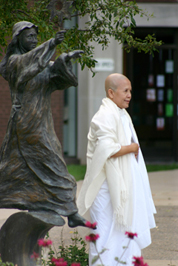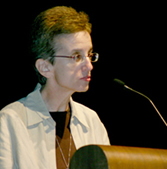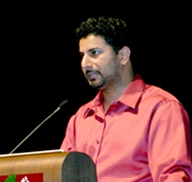Peace conference message: Gifting a future of peace is ours to do
The interfaith peace conference, Together, Creating a Culture of Peace, brought together the Franciscan Sisters of Perpetual Adoration, the Franciscan Sisters of the Eucharist (FSE) and the Sisters of St. Francis of Assisi (OSF), to celebrate 160 years of a common founding. Joining them in celebration of the Franciscan Common Venture’s tenth anniversary were the Tertiary Sisters of St. Francis, Cameroon, West Africa. They also celebrated the beginning of 132 years of FSPA perpetual adoration. More than 400 conference attendees gathered in Viterbo University’s Fine Arts Center on Aug. 1, 2009, for the conference that, according to Sister Paulynn Instenes, planning committee chair, took 160 years to get to and three years to plan.
Peace conference attendees, representing several countries, included sisters from the sponsoring congregations and their lay partners in ministry, FSPA affiliates, FSE apprentices and OSF associates. Also in attendance were Catholic sisters from other religious congregations and members of the general public. Notably, representation from key organizations included Marlene Weisenbeck, FSPA, Leadership Conference of Women Religious then president-elect, now president; Mother Shaun Vergauwen, FSE, Council of Major Superiors of Women Religious treasurer; and Ramona Miller, OSF, Franciscan Federation president.
Sister Marlene welcomed guests on behalf of the Franciscan Common Venture. “Since 1999 the four congregations of the Franciscan Common Venture have been living our mission of fostering a deeper understanding of becoming Franciscans in the 21st century; of deepening the experience of global church; opening new understandings and experiences of equi-cultural relationships and supporting and encouraging mutual efforts to effect systemic change. We have the opportunity in our homes and houses of worship to create cultures of peace, to encourage creative conflict resolution and engage in Christ-like reconciliation. This is our task, the work of spiritual formation and shalom in which our speakers will guide us today.”
The conference opened with Morning Prayer; all present recited the Jewish, Muslim, Buddhist and Native American prayers for peace and sang the St. Francis Prayer for Peace. Presenters invited to address the conference were Mae Chee Sansanee Sthirasuta, speaking to the importance of forgiveness, Ilia Delio, OSF, offering the Franciscan perspective of peace in relationship with creation and Azam Nizamuddin, bringing the need to petition for peace. Father John Heagle led a panel discussion with the speakers and Dr. Robert Zuber, director of the project for United Nations Emergency Peace Service and Global Action to Prevent War.
 Mae Chee Sansanee Sthirasuta
Mae Chee Sansanee Sthirasuta
The heart, and tone, of the peace conference was set by Venerable Mae Chee Sansanee. Many remarked that simply being in this gentle woman’s presence was a transforming experience. Mae Chee, a spiritual leader from the Thai Buddhist tradition, is a world-renowned peace messenger. Her message of forgiveness—having peace from within—as an important element in peacemaking, stems from her father’s decision to leave the family during her childhood. “I grew up in the arms of my loving mother never speaking a bad word of father.” To her audience, Mae Chee declared that she is a woman without hate. “I have given forgiveness to my father with my whole heart.” The forgiveness that she learned, according to Mae Chee, helps her teach others how to forgive.
In her work with Thailand’s youth, Mae Chee helps children understand that no one is worth hating. “I always have a note in my mind to have happiness in my heart every where I go,” said Mae Chee, speaking through a translator. “I remind myself when I travel and meet someone, that every person is special to me. Every time I go, it reminds me that love and forgiving is in ourselves and we can be love and forgiveness to every person.” She stressed the need to learn to have forgiveness and that anyone can be forgiven for anything.
Mae Chee asked the conference to engage in small group activities with one another that included breath work. She asked those present to slow down, breathe and realize that “the most precious moment is now.” “Nature brings us back to the present moment,” she said. “Breathing consciously is the foundation to help your wisdom grow.” She continued, “No matter where you go, the breathing is the same.”
In her closing, before she put her hands together as if in prayer and slightly bowed to her audience, Mae Chee offered this; “To be happy and content just because we are able to give unto others is the essence of making this world beautiful. We cannot change the world but we can move the world without the world realizing it’s being moved.”
 Ilia Delio, OSF
Ilia Delio, OSF
Bernardone Rock, FSE, introduced Sister Ilia as the author of several books and the recently published Christian Life: An Adventure in Love (a series of 24 talks on eight audio CDs) and as the recipient of two prestigious awards from the Catholic Press Association for her book Care for Creation. Sister Ilia shared the Franciscan perspective of peace in relationship with creation in her presentation entitled: Is Peace Possible? A Franciscan Response.
Her first visual displayed before the crowd was an image of war. “We live in a time of war,” said Sister Ilia. “We have been at war for the last 25 years or more and the question of war lies at the heart of the human person today.” She recognized that her students born in 1981 or later have been born into war and know nothing else.
So why is it that we have developed a culture of war over the 20th century, a century that Sister Ilia said “has been the most violent of centuries in the history of humanity?” She offered words from A Terrible Love of War by James Hillman: “War is part of our communal and collective psyche,” to which she commented, “Whatever it is that is continuously compelling us to war, we continue to follow that direction.”
As a possible answer to the questions “What are the roots of violence?” and “Are we innately violent?” Sister Ilia offered this: “Anthropologists and those who have looked at the evolution of the human person tell us that our human origins, pre-human into human (about 7 million years, the early homo species) were cooperative, land dwelling beings.” So, in the earliest origins of humanity, there seems to have been more of a oneness with the Earth and the environment. If that’s true, then you might say violence enters into the emergence of humanity in that development of evolution. “I would call it a fall-upwards in our evolution toward greater consciousness and complexity—a type of consciousness that we can call individualization. Our evolution from being one with the Earth into becoming individuals has set us over and against the Earth and one another.” Individualization happens when we evolve into more conscious and complex beings as homo sapiens and developed a sense of autonomy, freedom and identity. With those has come tribalism and rivalry.
According to Sister Ilia this is an unfinished universe—it has a 14 billion-year old history. The future prediction is about 100 trillion more years. She asked, “So what are we doing here and how do we get caught up within a universe that is 14 billion years old, as far as we can tell, with billions of more years into the future? What does it mean to be a person of peace in a universe that is moving forward into a new future?”
Referencing the previous presenter, Sister Ilia said, “Mae Chee brought us to that deep center of peace. What Francis advocated for was for a change of heart.” She suggested we need a new consciousness, a new level of being in the world and that this includes a conversion from a closed way of being to an open way of being—an authentic way of being toward a ‘God-centeredness.’ Earlier in her presentation, she mentioned that “we seek to control for selfish reasons.” A conversion “loosens the grip of control, the ‘my way or no way’ and allows others to be. It’s a moving from where ‘I’ control the situation to where I let ‘you’ be ‘you’ and see ‘you’ as an icon where God’s light is shining through ‘your’ being-ness. It’s where ‘all is gift.’”
“Our choices now shape the world. We can create fields of peace or fields of violence. Peace lives on a horizon of a new future. The universe cannot attain peace without us. Unless we accept the gift of peace inside us we will not find peace outside us. If we want peace, then creating a future of peace is indeed ours to do.”
Azam Nizamuddin
 As a board member of one of the oldest national groups promoting tolerance and understanding between people of various faiths and backgrounds, the Chicago Center for Cultural Connections, Azam provided the conference an introduction to some of the issues that are important when the issues of peacemaking, justice, religion and politics are talked about. He also gave an overview of the concepts of peace and justice in the Islamic culture.
As a board member of one of the oldest national groups promoting tolerance and understanding between people of various faiths and backgrounds, the Chicago Center for Cultural Connections, Azam provided the conference an introduction to some of the issues that are important when the issues of peacemaking, justice, religion and politics are talked about. He also gave an overview of the concepts of peace and justice in the Islamic culture.
In what he called a grim reality, Azam recognized that “as communities continue to compete in the new process of globalization then communication, cooperation and conflict will inevitably increase.” He noted a challenge for those who study, teach and observe religion and its various manifestations; “Those of us involved in inter-religious dialogue in peace must address the question of how we can maintain our unique religious traditions in a multi-religious world.” Azam posed several questions: “how can we maintain our unique religious tradition in a multi-religious world? How can we pursue our spiritual, social and cultural aspirations without denigrating others? Can a religious community develop its future or fulfill a religious destiny without eliminating or persecuting another religious community?”
According to Azam, religion can be used for positive purposes and aspirations or for negative ones as well. “This is where we get involved with articulating our vision for society that is not only theological but has practical implications for those outside of our religion.”
He introduced the conference to the powerful story of Abraham: “On the threat of physical harm by his own father, Abraham does not strike out at his father physically. He does not condemn his father. Instead, he replies, ‘peace be unto you father. I will ask my Lord’s forgiveness for you.’” Azam said, “Abraham’s attitude to the threats of his father should make us all reflect how the friends of God react to those who disagree with them. It should make us pause and ruminate about the Abrahamic approach, or the heart of tolerance, to disagreement.” According to Azam, “The Abrahamic ideal in Islamic thought is best reflected in the designation of Abraham as the ‘friend of God.’ Abraham thus represents the prototype of the ideal friend. It is the friend who stands up for truth.”
Another element within Islamic thought is the concept of love. Contrary to pop-culture’s idea of romantic love, Azam offered, “the notion of love found in the essence of mans’ relationship to God is one based on loyalty. It is love that is unconditional. The idea of love has its basis in the Quran, for God loves those who are pious and kind.” Azam mentioned this concept as readily seen in the works of Jalaluddin Rumi and Abu-Hamid al-Ghazali. “al-Ghazali says the love of God is the highest of all.”
In closing, Azam shared guidelines that he said “we all can use as we look forward to advocating a fellowship of peace:”
- Remember God first, above all and throughout the process. No peace can be established without an awareness of God.
- Try to draw all parties into a common frame of understanding.
- Never cease to remember that all acts have consequences.
- Strive for justice. It isn’t easy.
- Help contestants to clarify their principles and hold them to these.
- Ease the hearts of the oppressed.
- Respect the human dignity of the opponent.
- Lift up the generosity of God.
Following Azam’s presentation was a panel discussion led by Father John Heagle. The audience addressed the panel with several questions about going forward as peacemakers and about the role of women in those efforts.
Dr. Robert Zuber said this about the U.N.: “One of our most successful programs is Women, Peace and Security [an Inter-agency Task Force established to address the role of women in peacemaking, peacekeeping, humanitarian assistance and other activities]. We started a mentoring group for young women who are interested in peace and security as careers and we’ve had a difficult time finding older women to mentor younger women.” Dr. Zuber indicated that there are reasons for this that he did not disclose, but did offer that for most of the women present “it’s time to start coaching.” According to Dr. Zuber, “There are lots of women who may never take vows but who have much to learn from your life experience and your wisdom; this is a chronic need in the professional development of younger women.”
Sister Ilia said this about going forward: “We live in a culture of isolation and individualism. We need communal gatherings, ritual times, places where the potential for goodness and peace and where the mothering of the future—unity and love, can take place.
The peace conference closed with Liturgy presided by Father John. The service included a Cameroonian Gospel procession which, in some tribes in Cameroon, is used when tribal leaders have an important message to communicate to the people. Intercessions were offered in multiple languages including: English, Carolyn Heil, FSPA; Cameroonian, Marie Therese Diang, TSSF; Hindi/Thai, Joy Amornmaneekul (translator for presenter Mae Chee Sansanee); Arabic, Rose Mesa, FSE; Hebrew/Spanish, Rosalia Vadala’, OSF; German and English, Eva Marie Kauffhold, TSSF. A Cameroonian drum finale played as peace conference attendees exited the Fine Arts Center—going in peace.
An unexpected outcome
Through Mae Chee’s translator, Joy Amornmaneekul, FSPA has learned that Mae Chee, so inspired by FSPA perpetual adoration, initiated 24-hour meditation at the Holy Buddha relics room at Sathira-Dhammasathan in Bangkok. Mae Chee is the founder and director of Sathira-Dhammasathan, a center and learning community for peace and harmony, providing a variety of programs for people of all ages, gender and walks of life. According to Joy, “The people in our community are delighted with the 24-hour meditation; I enjoy meditating in that room.”


